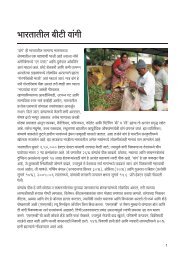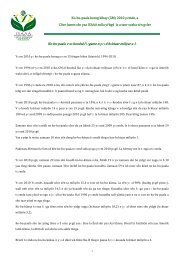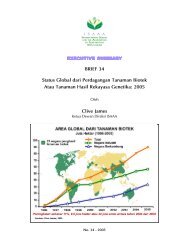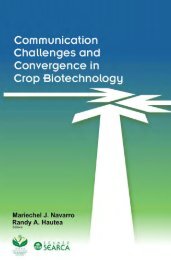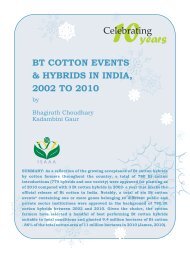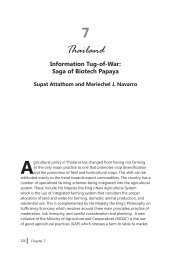Strategizing Communication in Commercialization of Biotech ... - isaaa
Strategizing Communication in Commercialization of Biotech ... - isaaa
Strategizing Communication in Commercialization of Biotech ... - isaaa
Create successful ePaper yourself
Turn your PDF publications into a flip-book with our unique Google optimized e-Paper software.
Khondoker M. Nasirudd<strong>in</strong><br />
have limited facilities for toxicological research and label<strong>in</strong>g (23.08%) and<br />
germplasm/characterization facilities (37.04%). However, they are ma<strong>in</strong>ta<strong>in</strong><strong>in</strong>g<br />
and us<strong>in</strong>g related crops (48.15%) and wild germplasm (50%) for crop<br />
improvement. There is negligible number <strong>of</strong> experts <strong>in</strong>volved <strong>in</strong> R&D <strong>in</strong> the<br />
areas <strong>of</strong> biodiversity and biosafety.<br />
The Bangladesh government is very supportive <strong>of</strong> agricultural biotechnology<br />
and more particularly on the development <strong>of</strong> transgenic crops. Currently,<br />
the first batch <strong>of</strong> crops <strong>in</strong> the regulatory pipel<strong>in</strong>e <strong>in</strong>clude Golden Rice, Bt<br />
br<strong>in</strong>jal (eggplant), and virus resistant potato. Many scientific experts believe<br />
that it is high time to raise awareness on biotechnology, transgenic crops,<br />
and biosafety regulations. The biotechnology, biosafety, and related acts for<br />
handl<strong>in</strong>g <strong>of</strong> LMOs await the formulation process. The approval <strong>of</strong> regulations<br />
for GM food is currently not applied to imports <strong>of</strong> corn and soybean. There<br />
is also a lack <strong>of</strong> governmental capacity to handle approval and the partial<br />
implementation <strong>of</strong> the biosafety laws (Gruere, 2006).<br />
Biosafety guidel<strong>in</strong>es and regulations for gM Crops<br />
In accordance with the precautionary approach conta<strong>in</strong>ed <strong>in</strong> Pr<strong>in</strong>ciple 15<br />
<strong>of</strong> the Rio Declaration on Environment and Development, Bangladesh<br />
formulated a Biosafety Guidel<strong>in</strong>e for ensur<strong>in</strong>g safety <strong>in</strong> the laboratory,<br />
field trial, safe transfer, handl<strong>in</strong>g, use, and transboundary movement <strong>of</strong><br />
GMOs/LMOs. The National Biosafety Framework (NBF) is also <strong>in</strong> place to<br />
formulate, review, update or amend national policies, guidel<strong>in</strong>es, acts and<br />
rules on biosafety and shall supervise risk assessment, risk management, and<br />
implementation <strong>of</strong> activities. Research, development, and promotional or<br />
commercialization activities <strong>in</strong>volv<strong>in</strong>g organisms with<strong>in</strong> the country that result<br />
from natural reproduction or micropropagated products derived through<br />
tissue culture or the use <strong>of</strong> traditional breed<strong>in</strong>g practices do not need any<br />
biosafety regulations.<br />
Bangladesh does not have any rules or regulations directly related to GM<br />
crops. However, some related laws may address the issues that may arise<br />
regard<strong>in</strong>g GM crops. These laws (Huq, 2005) may be related to agricultural<br />
production, environment and forests, drugs manufactur<strong>in</strong>g, import<br />
208<br />
Chapter 9



